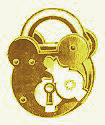 |
ENOCH TONKS & SONS LTD"ETAS" Temple Works, Temple Bar, Willenhall |
|
 |
ENOCH TONKS & SONS LTD"ETAS" Temple Works, Temple Bar, Willenhall |
|
Having made some progress the firm was moved to Temple Bar, where two houses were bought with a small shop, later the spring shop, with a second floor over it which was used as an office and warehouse. A wooden shop was built from this to where the polishing shop would later stand, in which worked about ten men with a few hand presses and a pair of shears. Then another wooden shop was built backing on to this one and, after a short time, a large press was bought with a 12ft swage, which enabled the firm to blank and raise pressed steel lock cases for mortice and rim locks. (This would have been similar to the one that can be seen in the Lock Museum). This press was operated by two persons running round about ¾ of a circle to get up enough speed and pressure to blank the case, then walking back and repeating the process. This was the start of steel case locks which, being easier and cheaper to produce, commanded more trade and enabled the business to expand. So more land at the back was bought, reaching as far as Cemetery Road. A steam engine was then fitted and a large shop erected, and power presses bought, and everyone had to do what they could.
The locks made with this action found a ready sale, and some of the numbers are well remembered by the workpeople, 604, 860, 626, 487, etc. And so, with this progress, a gas engine was purchased and was in what was later the tool room. Brass casting shops were built for the firm to do their own casting. Still making progress a piece of land was bought at the back of the large shop and the first four bays of the machine shop erected, and the gas engine moved and another one bought to cope with the increasing trade. Then, after the fire in 1914 which gutted the machine shop and nearly overwhelmed the works, the machine shop was re-built and enlarged and electric motors fitted to replace the gas engines.
About the same time the firm started making all kinds of builders brass foundry, which meant a development of the polishing and plating shop. Next they made brass iron cabinet locks and knocked down the four small houses at the front of the works for this department. In 1921 they became a limited company and started to make cylinder locks and soon had to increase the cylinder latch and lock department. With all this increased output the old fashioned varnish stoves could not cope with the work, so a conveyor varnishing plant was installed and also, as time passed along, new improvements were made in all departments and range of manufacturers had been increased in all departments, such as penny-in-slot locks, shop door locks, etc. The goods now became well known in all quarters of the globe as reliable and of the best quality and this enabled them to guarantee, because of the loyalty and pride of workmanship, which has been instilled into the employees and which they have loyally carried out.
The die casting factory was demolished at the end of 2000 and residential properties erected on the site.
Advert for the ETAS trade mark,
The Ironmonger, 1961 The text of the Gazetteer entry above is as Jim Evans wrote it in 2002. In February 2005, in Melbourne, Peter Hoyne examined a lock which his maternal grandparents, Alfred and Fanny Meachem, had brought with them to Australia when they emigrated from Willenhall in 1926. The brass padlock, which is about 65mm wide and 80mm long, is still in good working condition. It is inscribed: "E. Tonks & Sons Willenhall" and "4 lever" with the numerals 19, followed by two other numerals, of which the last may be 1 or 4.
On reading the opening lines of this entry in the Gazetteer, Peter says that he "became somewhat perplexed. Did my Grandfather engineer an elaborate hoax which was only to be revealed fifty years after his death; or did Enoch Tonks, even with his strong distaste for padlocks, manufacture at least one inscribed with his company name? Is this a padlock which Enoch Tonks disavowed?". It seems to me that there might be many explanation of what is going on here. The idea of Alfred Meachem making a hoax lock and then not telling anyone, seems unlikely. It may be that the locks were made by someone else for Tonks. It may be that it was only in Enoch's time that his firm did not make padlocks. It may be that the story Jim Evans had was only a legend. All further information or suggestions would be very welcome.
|